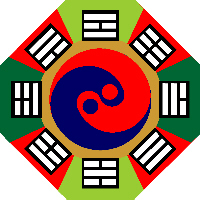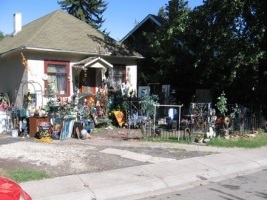
please read the postscript below
and the following Rebuttal
 |
FENG SHUI please read the postscript below and the following Rebuttal |
| Your neighbors will appreciate
it, even the effort. I am still working on it. If the neighborhood down-keep bothers you think about moving or report them to trash amnesty. |
 |
| Actually, Feng Shui is anything, but simple. It consists of thousands of principles, yet, at the same time, offers an enormous amount of flexibility. Straight lines and sharp angles in your home or garden produce bad luck. Change your luck by hanging a mirror, moving an end table or, in gardening terms by planting trees in an appropriate manner. |
 My bedroom |
 The kitchen |
 The dinning room. |

After posting this I got some interesting feedback. Part of it was:
"...Doesn't
matter what the compass is pointing to or what happening
up in space, if you build/arrange your house on a fault line or
in the valley
of an active volcano, you're asking for trouble. Tectonic activity,
magnetic field of this plant (now becoming unstable),
meteorites just don't
recognize Feng Shui." by Patty -- and adds a rebuttal.
This got me to thinking on this some more. I thank her very much. I will now have to update the other article as well.
The modern and insulated American society does not appreciate how important terrain is to someone who has to understand and adapt to it in order to live with it. Our forefathers be they farmer or rancher in the Midwest or Wyoming certainly did. Planting protective trees and placing your home or barn doors in relationship to prevailing winds or blizzards meant life or death for oneself and the animals. The survival of the latter – the survival of the family.
It was not that one fights nature, but living with it. Making accommodations - because you understood nature would not.
Does Feng Shui
make sense? Partly. But some of those 'rules' were meant to reflect
the everyday
travails the peasant in China faced and was later exaggerated by
necromancers
and the P.T. Barnums of that day, who took it to new levels.
The orientations suggested would never
apply to Australia as weather challenges would come from
another directions
entirely.
I
realize I
needed to make some edits on
that article. Origin began in India and coming to China by the
Buddhists. The name comes from paying more
attention to the
wind
and water! Two things that the farmer had to deal and adapt
to. I
doubt they had
any interest in the 'placement of
objects and foo foo as their
possessions where to few to begin with.
As
for augmenting the divine force of
'Chi,' this would naturally occur where two natural features
meet, as earth
meets water. The farmer whose land possessed a pond or natural
stream was fortunate
enough. That is plain bloody sense. As for that being
translated into 'flow'
of paths or planter beds that was simply a reflection of
planting on sloped
terraces or being leery of straight flowing streams that could
erode your farm.
Such 'Chi' floods remind us that sometimes it can move too
fast for us.
Feng Shui placements of windows affecting depression. You betcha. A positive placement of windows – giving you an 'open' view and connection between your dwelling "earth" and the "heavens" makes sense. Especially when you considered that some of these people lived in yurts or as our pioneers did in overturned covered wagons, covered with sod to keep the wind and cold out. Windows were a luxury and if finally obtained were carefully and frugally placed.
All
of this is based on practicality
and I should suggest it should be renamed to reflect 'wind and
water' with
'earth' as well. Most Native American tribes
understood this amalgamation very well
and sited their dwellings and villages accordingly. It did not
need a
traveling Buddhist to teach them that.
As
for your comment: "Tectonic
activity, magnetic field of this plant (now becoming
unstable), meteorites just
don't recognize Feng Shui." I totally
agree. Vulcanism, glaciers and changes
to the climate are things we really cannot do much
about.
That
said, we certainly are not as observant of nature as our ancestors were
and when a financial or tectonic event occures, this gadget dependent
"New Generation" might have a rude awakening. I am not even sure if
being hooked up to your Cable, Kindles and IPods is such a benifit
after all. The potential for becoming an evolutionary "black hole" is
only one giant solar flare away.